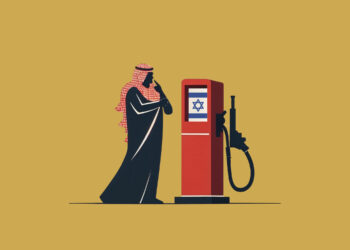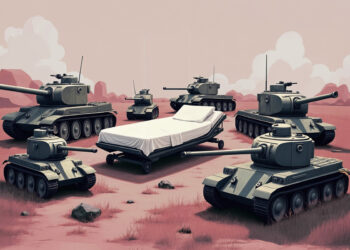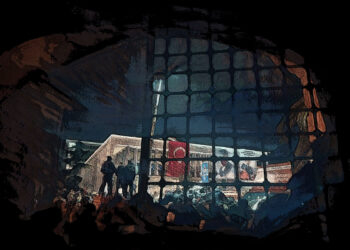Every single day we wake up with new updates of systematic death and destruction. This has happened for at least the entire past year. The efforts to keep pace and share them with the world are not only emotionally exhausting, but create a strong after effect of cognitive dissonance, as we have to acknowledge the denial, the pretence of normality, and the lack of empathy of a consistent part of the world.
While it is a kind of frustration that people caring for other causes, or narrating other conflicts, may have already experienced, there is an unedited short circuit in how the pain of “others” is being communicated, shared, and experienced in front of the radical violence Israel imposed on Gaza – and now on Lebanon – during the last year.
This is a collection of notes, trying to make sense of this continuous frustration and powerlessness many of us are experiencing during this period. Based on how some media activists and observers commented on their experience, and my own of course, I identified four ‘anomalies’ that can help to at least partially explain this short circuit. They do not necessarily belong to new phenomena. In a way, they are perhaps the natural continuation of processes that were in motion for a long time. Whatever the case, there is no doubt we are living in an era in which the façade of normality has collapsed.
Normalising the intolerable
A couple of weeks ago I stumbled upon a video podcast in which Henry Winkler (the ‘Fonzie’ of Happy Days) was discussing the ongoing events in Palestine with Bill Maher, an American comedian.
At a certain point, Maher maintains that the Israeli army is making everything it could in order to avoid killing civilians.
Winkler looks astonished:
– Are we watching the same footage?
– Do you believe they are intentionally killing civilians?
– I think it is indiscriminate.
The clip went quite viral, with many pro-Palestine commentators sharing the excerpt where ‘Fonzie’ supposedly ‘puts Maher in his place’.
There is a problem though. Winkler does not stand up and leave the studio, even after an exchange that exposed his host as someone justifying an ongoing “indiscriminate” carnage of civilians. The clip ends with the two celebrities discussing the delicacy of Israeli food.
I think the dialogue exemplifies one of the main anomalies we are confronted with in our current cultural and political environment.
How do you engage and debate with people who are clearly assuming genocidal, racist, and colonialist positions, without legitimising them and normalising the massacres as something that can be calmly analysed while sitting in comfortable chairs in a television studio?
It is a dilemma that is widely discussed among activists, journalists and scholars who are trying to challenge pro-Israeli propaganda narratives.
Mehdi Hassan, one of the most vocal and prominent journalists committed to condemn what is happening, was harshly criticised for accepting to debate in public with PR figures/fact deniers such as Eylon Levy, a former Israeli government spokesperson.
On the other hand, how should we react when, as another video recently shows, the Berlin mayor (CDU) says that “(genocide) is not taking place, period. I thought we were already over it”?
It is nothing new of course: trivialising the horror and the suffering of wars, or of relevant issues, churning them into a spectacle for the sake of audience ratings and popularity was always part of the modern media machine.
However, the alleged presence of common rules once allowed to set some limits against falling completely into a post-truth dystopia in which dialogue, even if staged, becomes impossible, as there is no common ground anymore.
To bring these questions to their extreme: if we were living in Europe during the 1930s, but foreseeing what happens next, would we be sitting to argue with fascists just for the sake of saving the appearance of the democratic game? Or in the belief that we can negotiate with them a solution that does not include your total annihilation?
It could seem far-fetched as a parallel but it is not. Far right parties and movements are on the rise everywhere. The economic conditions are worsening. Wars rage everywhere. In this context, Israel’s doings are clearly accelerating the demise of the liberal democratic order. As Eyal Weizmann, the founder of Forensic Architecture, pointed out at a recent meeting in Berlin, the genocide requires necessarily a huge effort to silence critical voices and muster support everywhere else, and especially in the US. In front of the massive and diverse global movement protesting the massacres in Palestine, and now in Lebanon, the only choice for those against it is to repress these voices by force and threats, and to have mainstream media completely aligned: this is compromising, as we already analysed in detail, their last remnants of credibility. Finally, Gaza and Palestine in general have become the laboratory to test technologies, from biometrics recognition devices to AI targeting machines and drones for surveillance, which can be repurposed in other contexts, further endangering democracies and public coexistence.
The belief in pure force
The second anomaly, strictly related to the first one, is that we are navigating in the middle of the resurgence of a colonialist discourse that permeates a large part of the debates. The constant reference to a clash of civilizations and the need to defend the so-called West implies that Israel is at this moment the frontline and must be defended. Recently, in Italy, the country I am originally from, Federico Rampini, one of the most known pens of a once leftist newspaper, La Repubblica, published a book by the title Thank you West (Grazie Occidente). In a video trailer, he explains that he wanted to show that the Western civilization made the world better, as it brought technologies and science discoveries that saved or improved the life of many natives.
Words like ‘civilization’ are back into the political vocabulary, not only among the far right, but among so-called ‘centrist’ liberal elites. It is as if we were erasing decades of historical understanding of what the colonialist experience was to those subject to it.
It looks like the political language went suddenly back to the 19th century. As I was recently reading the novel Sea of Poppies, written in 2008 by the award-winning Indian writer Amitav Ghosh, and set at the dawn of the first Opium war, in 1839, I found the resemblance in terms of political discourses just uncanny.
Against the pervading pretence of morality, a disillusioned British ship captain decides to rant: “We are no different from the Pharaos or the Mongols: the only difference is that when we kill people we feel compelled to pretend that it is for some higher cause. It is this pretence of virtue, I promise you, that will never be forgiven in history”.
This echoes Joseph Conrad’s passage in Heart of Darkness where Marlow, the sailor protagonist, says “The conquest of the earth, which mostly means the taking it away from those who have a different complexion or slightly flatter noses than ourselves, is not a pretty thing when you look into it too much. What redeems it is the idea only. An idea at the back of it; not a sentimental pretence but an idea; and an unselfish belief in the idea—something you can set up, and bow down before, and offer a sacrifice to”.
Perhaps today even that moral pretence, or idea, appears not necessary anymore. In a recent thread on X, Peter Harling, an analyst and co-founder of the platform Synaps, commented on the pagers terrorist attack in Lebanon, noting that Israel always built its modus operandi on a disproportionate retribution against its enemies, showing a total contempt towards international laws. It exhibits, he writes, a “hubristic belief in pure force”.
This reflects the painful description by Omer Bartov of a country trapped into its self-inflicted curse of relying on a perpetual state of war or the idea, suggested by Hardt and Mezzadra, that we entered into a global war regime.
This way of thinking is inevitably contaminating Israel’s allies, as soon as they decided, after the 7th of October 2023, to support it unconditionally. A colonial mindset has been revealed, but it is dressing in a new cloth. It accepted it was losing its hegemonic battle at the global level, perhaps even internally, and decided it should rely only on its military superiority. They can content themselves, as Israel always did, to repeat mantras such as “the most moral army in the world”, and whip around the word “terrorist” against its targets or even pretend that the aim is to “liberate them”.
However, little remains of all the legal-cultural-political superstructure that served to justify its dominance on grounds other than weapons. The ‘unselfish belief’ or the ‘pretence of morality’ that we find in those novels set at the core of the colonial enterprise cannot serve even as fragile shells to hide the idea that strength is all that matters.
And here is the challenge that originates from this realisation: How to engage with interlocutors who embrace these views, with such recklessness and sense of impunity, and how to establish an authentic dialogue with them? Should we content ourselves to retreat into a sort of Gramscian war of position, and at least preserve memories and views, reinforce alternative channels of communication and media, establish solidarity networks, and reinforce alliances and organisations? What is left for us to do?
The inexorable paradox of making the horror visible
The third anomaly comes with the need to keep reporting and denouncing an interminable massacre. This is also not completely new. The effect of desensitisation of a public opinion incessantly submerged in news and images of violence has been recognized for a long time. American photographer John Berger already described the prolonged exposure to photos from the Vietnam war as having a de-politicizing effect. The picture, he says, “becomes evidence of the general human condition. It accuses nobody and everybody”. Those staring at the ongoing violence, powerless, are left with only two options: to shrug off their sense of inadequacy, or to perform a kind of penance, such as donating to human relief organisations.
Syrian media activists and photographers learned this very well during their revolution/civil war. Even in that case, in one of the most mediated events in history, the huge amount of visual documents recording war crimes and human rights violations did not trigger the expected solidarity among the international community, quite the contrary.
The situation in Gaza is of another level though. The massacres and destruction are unprecedented, much faster, and, above all, happen with the full complicity of the US and most European countries. It is difficult, even for media activists and people more involved, to keep the pace of the increasing violence and the so-called ‘bad news’.
The last bombing of a refugee camp appears as something that no one can tolerate, and a ‘hit the bottom’ tragedy, but a week later a school is razed to the ground. After Israeli hostages are killed while waving white flags, the corpses of Palestinian children killed by Israeli snipers are found. The recent mass bombing of Lebanon is another example. As escalation becomes the main trait of new warfare, it is also a strategy that puts us in front of our incapacity to narrate it.
The constant demand for human empathy, for the capacity to stare at the horror, and to keep all the threads (killings, displacements, bombings, humiliations, rapes, starvations, epidemics) together to recompose the puzzle of an ongoing genocide, is simply too much to ask for one long year. This is a classic challenge for media activists, journalists and scholars, but it reached an unprecedented level.
As Marwa Fatafta, a Palestinian journalist and activist, recently said: how to document and report all this horror, without ending up being complicit with the dehumanisation of Palestinians, who are reduced to numbers, and their images to images of victims? If this war is aimed at generating shock and awe, as an admonition to those who defy the new world order, aren’t we helping amplify that message?
The impossible task
The last paradox is how we can tell the story of a ‘destruction of the destruction’ and this is more specific to Gaza. Palestinian scholar and activist Yasmeen Daher recently used this expression to refer to the repeated act of erasure imposed on Palestinians in different phases of their history. Gaza is indeed a territory whose very existence originates from previous destructions. It is a land of refugees fleeing from the ethnic cleansing of historical Palestine. Even after the 7th of October, people displaced from the north while it was being annihilated and erased were bombed again, and often died, in the south, in tents in refugee camps in Khan Younis or Rafah.
This element adds a layer that is extremely difficult to be included, or explained, while reporting scenes of the actual destruction. Each time a building collapses, or tents are burned, or a street is turned into rubble: these are places and people that are being erased for a second, or a third time.
Images and photos, especially in a war, always send us back to those that are missing: images that no one was there to take, or that are too crude to be shown, but also images of the very same people living their ‘normal’ lives, in ‘normal’ times.
In Gaza, images of destruction always contain hidden histories of previous displacement, ethnic cleansing, ghettoization, and violence. The missing image this time would not show us what we identify with ‘normality’: it would tell us about another destruction, and would reveal to us that the act of erasure we are witnessing at this moment, through the images we have, is one that repeats itself.
It is extremely difficult on social media, or by any other means, on a daily basis, to communicate and even to grasp the extent of the tragedy behind the destruction of destruction. The erasure of memory is doubled, and the inadequacy of the images is even more pronounced than in other conflicts.
This is the last ‘anomaly’: How can we narrate what is happening in Gaza, while reminding ourselves, and others, that those people were not supposed to be there in the first place? That this is an erasure over the erasure, just an episode in a never ending exercise of violence?
Our frustration and shock do not come only from the exposure to horror and the injustice behind it. This time all our actions and possible responses are taking place in a different reality, with different rules and different interlocutors, and our future has never been so unclear.
A Syrian photographer once told me he felt the obligation to keep staring at the horror not only because of the victim, but first of all because of the person who decided to take that photo: the absent photographer.
Never before has our inadequacy been so manifest in ‘doing something’ with the overwhelming material that Palestinians, and now Lebanese, on the ground are producing at great peril whether they are ordinary people, journalists, or activists. And yet, they are often the first ones out of the frame of the visible, as they are those recording what happens to others, behind a camera, or relentlessly informing us behind a computer or smartphone, despite everything.
The drive to continue to struggle and confront these challenges comes from them, and for them.
The quotation by John Berger is taken from the essay “Photographs of Agony”, in Understanding a Photograph, originally published in 1967.
Yasmeen Daher and Eyal Weizmann reflections were offered during a conversation they had in KM28, in Berlin, on the 24 of October 2024.
The captain’s quotation is from Sea of Poppies, Amitav Ghosh, 2008, p. 275.
The sailor’s quotation is from Heart of Darkness, Joseph Conrad, in Chapter 1.
Thank you to Yazan Badran for his contribution to this text.








